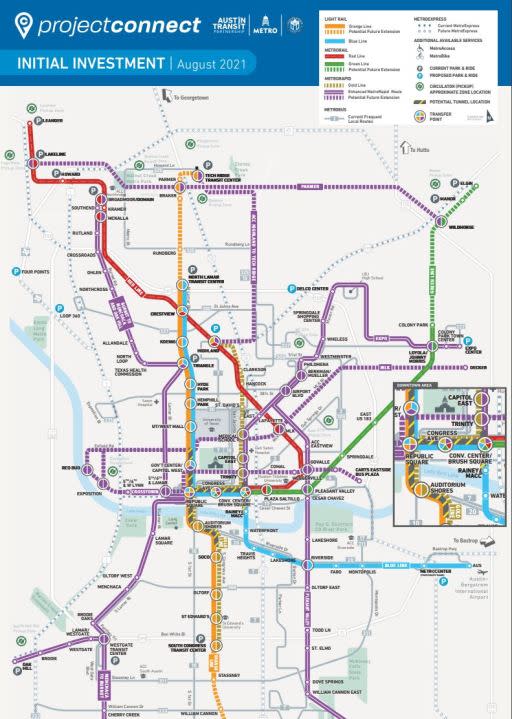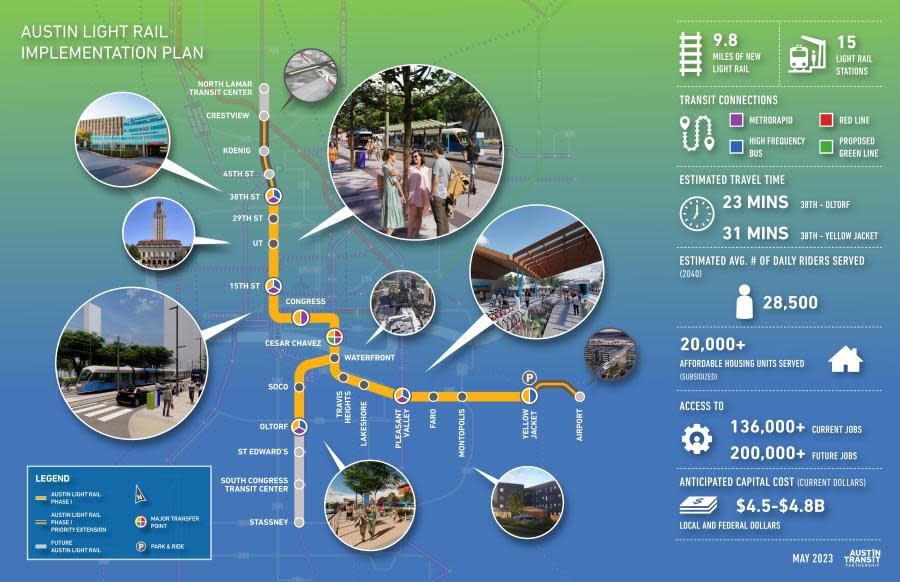Project Connect trial halts, punted to Third Court of Appeals
AUSTIN (KXAN) — A trial centered around the validity of the funding structure behind Austin’s Project Connect mass transit system began and quickly halted Monday, as Attorney General Ken Paxton’s office filed an interlocutory appeal to delay proceedings.
That appeal from the AG’s office is centered around whether or not Austin Transit Partnership — the local government corporation created and tasked with developing the Project Connect mass transit system — has the jurisdiction to bring forth a bond validation lawsuit, a petition ATP filed back in February. The AG’s office claims that ATP is not a qualifying entity and, therefore, is not subject to an expedited process provided by a bond validation petition.
Now filed, the AG’s appeal “will freeze the trial on the merits of our lawsuit as well as freeze the Austin Transit Partnership’s (ATP) attempt to issue debt” for Project Connect in the interim until the courts system can rule whether ATP is legally allowed to do so, per a news release Monday.
In response, ATP’s executive director Greg Canally confirmed ATP will file an emergency motion to dismiss the AG’s filing as a baseless appeal. That battle will hash out in the Third Court of Appeals.
In the meantime, he promised his staff would continue work on advancing light rail, particularly as the mass transit program has recently begun its project development phase via the Federal Transit Administration.
Should the Third Court of Appeals rule in favor of ATP, the fight will likely not end there. Bill Aleshire — co-counsel representing a group of plaintiffs who filed a lawsuit against Austin City Council and ATP over Project Connect in November — said they’d appeal the Third Court of Appeals’ ruling to the Texas Supreme Court, should a ruling in favor of ATP happen.
“We were looking forward to making our legal attacks in court when we filed our original lawsuit. Had ATP not rushed to borrow huge sums of money years before they even need it with this bond validation lawsuit, and instead proceeded to trial with our original case, we would have been able to show the proposed financing mechanism was never legal, the plan sold to voters was never realistic, and the Contract With The Voters has been breached too many times to list,” Aleshire and fellow co-counsel Rick Fine said in the Monday release. “ATP’s decision to bring this bond validation lawsuit is yet another mishap by our local officials in trying to perpetrate this farce on all of Austin.”
Monday’s intended start of the trial marked a delay from its initial start date, slated for May 28. The consolidated case is centered around two key issues: the bond validation petition filed in February by the ATP to validate the light rail’s funding structure, as well as the lawsuit filed against Austin City Council and Austin Transit Partnership in November related to changes in the light rail plan.
Monday’s intended bench trial was overseen by Judge Eric Shepperd.
Here’s the backstory on both respective components of the trial.
Bond validation petition
A driving component of Monday’s trial is verifying or denouncing the validity of Project Connect’s funding structure. In November 2020, City of Austin voters approved increasing the city’s property tax rate, with a dedicated 8.75-cent revenue stream to fund the Project Connect mass transit system. ATP officials have cited Senate Bill 2 — passed by the Texas Legislature and adopted into law in 2019 — as justification of the funding mechanism.
Among a host of property tax rate changes adopted through this law, it stipulated that municipalities increasing the tax rate by more than 3.5% must have voter approval before any property tax rate increases take effect.
ATP argues that the City of Austin has the right to pay that Project Connect tax revenue “pursuant to an interlocal agreement” between the two entities, and that ATP has the authority to use those revenue payments as repayment for its bonds and any other obligations incurred through the process of developing the light rail system.
PAST COVERAGE: Trial set in Project Connect funding structure debate
The bond validation petition filed by ATP aims to “expedite a determination from an impartial court to affirm ATP’s bond program,” per a February statement from the local government corporation.
However, the validity of that funding mechanism has been challenged, most notably by Texas’ attorney general. He issued an opinion in May 2023 where he argued Texas’ tax code “does not authorize a municipality to ‘earmark’ use of a voter-approved increase in its maintenance and operation property tax revenue for debt service.”
In a pre-trial brief from Paxton filed earlier this month and shared with KXAN, Paxton referred to the 2020 proposition’s ballot language as “necessarily defective and misleading,” arguing the City of Austin used a tax ratification election “outside the purposes for which it was designed.”
Had the City merely submitted to voters a tax bond proposition for the proposed capital project and the voters approved it, there would be clear statutory authorization to issue ad valorem tax bonds up to the maximum principal amount authorized, assuming all other state law requirements had been met. But the City did not want to limit itself to a maximum amount of bonds. Rather, the City sought to earmark a percentage of its maintenance tax rate collections to be handed over indefinitely to a local government corporation under a funding agreement to pay the local government corporation’s bonds. That agreement was void ab initio upon its execution because it created an unconstitutional debt.
Pre-trial Brief of Attorney General
If Shepperd sides with ATP on this issue, it would essentially force the AG Office’s hand to approve the program’s bond issuance. However, if Shepperd’s verdict rules against ATP’s bond validation petition, the Texas AG would have jurisdiction to decide whether ATP could issue bonds.
Background on the lawsuit against Project Connect
Bill Aleshire is serving as the lead attorney and representing the plaintiffs in the November lawsuit filed against Austin City Council and ATP. Included in the suit against Project Connect leadership are Austin restaurant Dirty Martin’s, former Texas Democratic State Sen. Gonzalo Barrientos, former Austin City Council Member Ora Houston, Travis County Commissioner Margaret Gomez and PODER’s director Susana Almanza.
The basis of the lawsuit centers around revisions made to Project Connect’s light rail plan, adopted by Austin City Council, ATP and CapMetro in June 2023. That revised plan broke up light rail implementation work into stages, with a nearly 10-mile route running from 38th Street to Oltorf Street and then to Yellow Jacket Lane adopted as phase one.
ICYMI: Lawsuit filed against Austin’s revised Project Connect light rail plan
ATP officials have said this would be only the first phase of a series of planned mass transit enhancements and light rail development as part of the Project Connect program. But lawsuit plaintiffs have said that the City of Austin and ATP are “collecting and spending tax dollars approved by voters in 2020 for a dramatically different Project Connect.”
The initial, full-scale plan presented to voters prior to the November 2020 election and for about a year and a half afterwards highlighted multiple light rail lines, expanded regional rail connectivity and bolstered MetroRapid bus lines.
A portion of the map of Project Connect, Austin’s transit system expansion. On the map, the Broadmoor station will stop at Uptown ATX (Map courtesy: Project Connect and Capital Metro) The Austin Transit Partnership is recommending the 38th Street to Oltorf Street to Yellow Jacket Lane is the first phase of light rail services to be built under Project Connect. (Courtesy: Austin Transit Partnership)
“The city and ATP are collecting and spending tax dollars approved by voters in 2020 for a dramatically different Project Connect than was recently approved by the City,” Aleshire said in a November release. “The law does not allow property tax revenue approved by voters for one project to then be used for an inferior replacement project. Nor can Austin just ignore statutory and constitutional restrictions on use of property taxes.”
ATP officials declined to comment on the lawsuit at the time, citing “pending litigation” and the corporation’s continued focus “to advance the project.”
Reactions from ATP, lawsuit plaintiffs’ legal counsel
Canally said in a statement to reporters the transit organization has “followed state law with every step” and they were prepared to defend their case at Monday’s trial.
“The vocal opponents to transit were not ready today, and the reason they’re not is because they know that this is a delay tactic and that the law was not on their side and on their position,” he said, adding: “We have the full faith the Third Court of Appeals will act quickly.”
Canally added he anticipates the Third Court of Appeals will act “judiciously” in ruling on the matter and returning the case to its trial setting.
While addressing reporters, Aleshire said he and his team of plaintiffs were looking forward to trial proceedings beginning on a project he referred to as a “bait and switch.” He blamed ATP for Monday’s delayed proceedings and the organization’s decision to move forward with a bond validation petition in February.
“As a result of choosing this litigation, they are the ones that brought the Attorney General into the case, not us,” he said, adding: “It is time, if there’s any leaders left in the City of Austin’s government, for them to recognize that the current plan for Project Connect is doomed one way or the other.”
He instead said city leaders need to consider hosting a November bond election for light rail with a finite price tag affiliated with the program, as opposed to the tax revenue stream format approved by voters in the November 2020 bond election that greenlit Project Connect in the first place.
Nancy Crowther has lived in Austin since 1980 and first voted for expanded public transit in Austin back in 1985. As a wheelchair user, she said she’s dependent on transit and was disappointed by Monday’s delayed outcomes.
“I’d like to get this trial over with,” she said. “I would like to see the taxpayers get their money’s worth that they voted for.”
A spokesperson for the City of Austin said officials are “disappointed” by the delayed proceedings, but expected it and will continue moving light rail plans forward.
“Because the Attorney General had been very clear about his intention to appeal this matter, we were not surprised,” the spokesperson said over email. “We are disappointed to have a delay in the proceedings but not surprised. Project Connect continues to move forward despite these legal proceedings.”
Those same sentiments aren’t shared by one Austin City Council member. In an emailed statement, Council Member Mackenzie Kelly said 2020 city leadership “chose not only to overpromise on Project Connect but also to pay for it through a legally questionable funding mechanism.”
“Austin voters and taxpayers will have to continue to wait for a drawn-out legal battle to unfold before transit improvements can be delivered—if they can ever be delivered at all—all while continuing to pay 21% higher taxes to the City in the meantime,” her statement read. “As the Council begins deliberations on the City’s annual budget, I will be working to provide Austinites tax relief on Project Connect until the dispute over its financing structure is resolved through the court system.”
Copyright 2024 Nexstar Media, Inc. All rights reserved. This material may not be published, broadcast, rewritten, or redistributed.
For the latest news, weather, sports, and streaming video, head to KXAN Austin.


